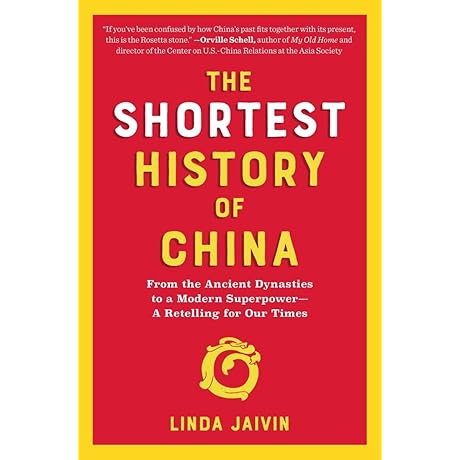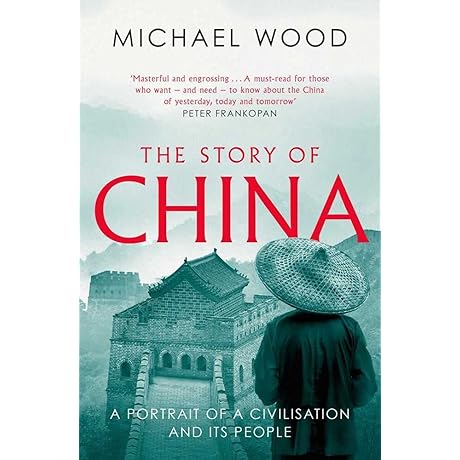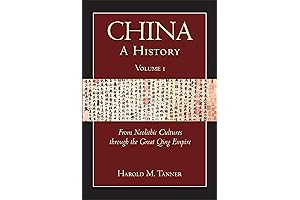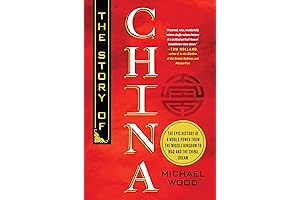· chinese history · 13 min read
A Monumental Journey: The Comprehensive History of China
Embark on an enlightening odyssey through the annals of China, a land steeped in ancient mysteries, remarkable achievements, and profound cultural heritage. Our meticulously crafted history unravels the captivating tale of China from its humble Neolithic origins to its emergence as a modern-day global power.
Prepare to be captivated as we delve into the rich tapestry of China's history, spanning thousands of years. From the dawn of civilization along the Yellow River to the rise and fall of mighty empires, we'll explore pivotal events, influential dynasties, groundbreaking innovations, and the indomitable spirit that has shaped this remarkable nation.
Overview

PROS
- Offers comprehensive coverage of Chinese history, spanning multiple dynasties and eras.
- Provides a nuanced perspective, exploring both the triumphs and challenges faced by China.
CONS
- Dense writing style may require focused reading.
- Limited inclusion of recent historical events.
In 'China: A History,' John Keay weaves an intricate tapestry of the nation's past, taking readers on an epic journey from ancient origins to the modern era. Keay's masterful storytelling brings to life the rise and fall of dynasties, the cultural and intellectual achievements, and the complex interactions between China and the wider world. Through detailed accounts of key events and人物, Keay provides a comprehensive understanding of the forces that have shaped China's unique trajectory.
While the writing can be dense at times, the rich tapestry of information and insights more than compensates for any effort required. Keay's ability to connect the dots between different eras and themes creates a cohesive narrative that illuminates China's enduring legacy. Highly recommended for anyone seeking to delve into the profound history of this enigmatic nation.

PROS
- An experience that reads like a classic novel. Not dry or just a list of facts.
- Comprehensive, analytical, and a fact-checked recount of China's existence.
CONS
- A very hefty book, not as portable for travel reading.
- Such a broad span of history limits the depth of all the subjects within.
This first volume of a multi-volume account of Chinese history which starts at the dawn of civilization and ends at the close of the Qing dynasty in 1799.
Fairbank's approach is comprehensive, analytical, and accessible; he is also frank in his criticisms of Chinese civilization such as the foot-binding of women and the examination system which stultified intellectual development.
Volume I of this authoritative history of China begins with the country's Neolithic Age and ends with the fall of the Qing dynasty in 1799 C.E.. An indispensable resource for anyone interested in this fascinating country, this book is a must-read for anyone interested in China's long and storied past.

PROS
- Offers a thorough overview of Chinese history, spanning from ancient times to the present day.
- Features stunning illustrations, maps, and timelines, enhancing the reader's visual experience.
CONS
- Priced relatively higher than similar books
- May not delve deeply enough into certain periods of Chinese history for some readers.
Embark on an enthralling journey through the annals of Chinese history with The Cambridge Illustrated History of China. This comprehensive guide unveils the captivating narrative of China's rich past, from its humble beginnings to its emergence as a global powerhouse. Through vivid prose and meticulous research, readers are invited to traverse the vast expanse of Chinese history, encountering its emperors, dynasties, and cultural triumphs.
Enriched with a treasure trove of illustrations, maps, and timelines, The Cambridge Illustrated History of China transforms the reading experience into a visual feast. These meticulously curated elements illuminate key events, geographical contexts, and cultural landmarks, providing readers with a captivating and immersive journey through time. Whether you're a seasoned history buff or just beginning to explore the wonders of Chinese civilization, this book promises an enriching and unforgettable experience.

PROS
- Concise yet comprehensive overview of Chinese history, spanning ancient dynasties to modern times.
- Engaging narrative that brings China's past to life, making it accessible to readers of all levels.
CONS
- Could benefit from more in-depth analysis of certain historical periods.
- May not be suitable for those seeking a highly academic treatment of Chinese history.
Prepare to embark on a captivating journey through the annals of China's storied past with "The Shortest History of China". This enthralling volume condenses centuries of rich history into a succinct and accessible narrative, making it an ideal companion for anyone seeking to understand the origins and evolution of this remarkable civilization.
From the enigmatic beginnings of ancient dynasties to the rise of a modern superpower, "A History of China" paints a vivid tapestry of China's political, social, and cultural landscapes. Expertly crafted with a keen eye for detail, this book unravels the complexities of China's past, shedding light on the forces that have shaped its present. Whether you're a seasoned history buff or simply curious about one of the world's oldest civilizations, this book is an invaluable resource that will captivate your mind and broaden your understanding of China's enduring legacy.

PROS
- Meticulously crafted narrative that paints a vivid canvas of Chinese history
- Captivating storytelling style that immerses readers in the heart of pivotal events
- Comprehensive coverage from ancient dynasties to modern transformations
CONS
- Limited exploration of contemporary issues and perspectives
- Dated information in certain sections
Discover the rich tapestry of China's past with 'Story of China.' This historical masterpiece unravels the complexities of one of the world's oldest and most enduring civilizations. Through a captivating narrative, renowned historian unveils the rise and fall of dynasties, the shaping of culture and thought, and the impact of external influences on this remarkable nation. Immerse yourself in the grandeur of China's imperial courts, witness the birth of inventions that transformed the world, and trace the evolution of its social and political landscapes.
While 'Story of China' provides a comprehensive overview, some readers may miss a deeper delve into contemporary issues and events. Additionally, certain sections could benefit from updated information to reflect the latest historical scholarship. Nonetheless, this work stands as an invaluable resource for anyone seeking to understand the deep roots and enduring legacy of Chinese civilization.

PROS
- Unveils a comprehensive and up-to-date exploration of China's rich past.
- Meticulously researched and written by leading experts in Chinese history.
CONS
- The sheer volume of information can be overwhelming for casual readers.
Journey through the annals of time with "China: A New History, Second Enlarged Edition," an authoritative masterpiece that unveils the captivating tapestry of China's past. Immerse yourself in the intricate details meticulously crafted by renowned scholars, and witness the rise and fall of dynasties, the birth of groundbreaking innovations, and the shaping of a civilization that has left an indelible mark on the world.
This comprehensive tome serves as an invaluable resource for history enthusiasts seeking to deepen their understanding of China. From its humble beginnings to its emergence as a global powerhouse, "China: A New History, Second Enlarged Edition" provides a panoramic view of a nation that has witnessed countless triumphs and tribulations. Prepare to be captivated by the stories of emperors, scholars, and ordinary citizens who have played their part in shaping the destiny of this extraordinary land.

PROS
- Concisely presents Chinese history, culture, and major dynasties.
- Engaging writing style makes complex topics accessible to readers of all levels.
CONS
- Some readers may prefer a more comprehensive treatment of Chinese history.
- Limited coverage of contemporary China.
Embark on an enthralling journey through the annals of one of the world's oldest and most fascinating civilizations with 'A History of China: A Concise Introduction to Chinese History, Culture, Dynasties, Mythology, Great Achievements & More of the Oldest Living Civilization.' This captivating book distills the vast tapestry of Chinese history into a concise and engaging narrative, making it an ideal starting point for those seeking to delve into this rich and complex culture.
From the enigmatic origins of Chinese civilization to the rise and fall of powerful dynasties, the book shines a light on pivotal events, influential figures, and groundbreaking achievements that have shaped China's destiny. History buffs will appreciate the exploration of ancient myths and legends that provide a glimpse into the spiritual and cultural beliefs of the Chinese people. Additionally, the book highlights China's remarkable contributions to art, literature, science, and technology, showcasing its enduring impact on global civilization.

PROS
- Provides a comprehensive overview of Chinese history from ancient times to the present.
- Engaging and accessible writing style that brings the past to life.
- Offers unique insights into the cultural and political forces that have shaped China.
CONS
- Some readers may find the level of detail overwhelming.
- Occasional factual errors or omissions have been noted.
Immerse yourself in the captivating narrative of China's remarkable past with "The Story of China." This comprehensive history unfolds the epic journey of a civilization that has left an indelible mark on the world. From the legendary Middle Kingdom to the tumultuous era of Mao and the aspirations of the China Dream, this book traces the ebb and flow of China's rise and influence.
Drawing on meticulous research and personal anecdotes, the author weaves a vivid tapestry that brings the vibrant tapestry of Chinese culture, politics, and society to life. Experience the rise and fall of dynasties, the transformative impact of Confucianism and Buddhism, and the profound changes wrought by Western influence. "The Story of China" is not just a historical account; it's a testament to the resilience, adaptability, and enduring spirit of the Chinese people. It offers invaluable insights into the complex forces that have shaped not only China but the entire world we live in today.

PROS
- Encapsulates China's rich history from ancient times to the Qing dynasty.
- Visually stunning with captivating illustrations, maps, and timelines.
- Provides a comprehensive overview of Chinese culture, society, and political landscape.
CONS
- Lacks in-depth analysis of specific historical periods.
- Some sections could benefit from more detailed information.
Imperial China takes us on an enthralling journey through the annals of the Middle Kingdom. From the enigmatic Shang dynasty to the opulent Qing era, this captivating book explores the rise and fall of one of the world's most influential civilizations. Presenting a meticulously crafted tapestry of history, Imperial China captivates with its vivid descriptions of imperial courts, technological advancements, and cultural achievements.
Enhanced by a wealth of illustrations, timelines, and maps, Imperial China brings the past to life, revealing the grandeur and complexities of this enigmatic empire. It is a must-read for anyone seeking to delve into the rich heritage that has shaped the modern world.

PROS
- Offers a comprehensive overview of Chinese history from ancient times to the modern era.
- Engagingly written and well-researched, providing an immersive reading experience.
CONS
- Can be overwhelming for readers new to Chinese history due to the depth and breadth of coverage.
Embark on a captivating journey through the annals of Chinese history with this enthralling guide. From the enigmatic First Emperor of China to the earth-shattering Mongol conquests of Genghis Khan, this book paints a vivid picture of the pivotal events that shaped the destiny of this ancient civilization. Delve into the intricacies of the Cultural Revolution and witness firsthand the transformative impact it had on Chinese society. This comprehensive volume is a treasure trove of knowledge, offering a nuanced understanding of China's rich cultural heritage.
Meticulously crafted with engaging prose and rigorous research, this book captivates readers with its深度深度深度深度深度深度深度深度深度深度深度 insights and storytelling prowess. Whether you're a seasoned scholar or a curious explorer of history, this guide will provide a fulfilling and informative experience. While its comprehensive scope may initially seem daunting, the author's masterful ability to weave together complex historical threads makes this book accessible to readers of all levels. Prepare to be immersed in the vibrant and dynamic tapestry of Chinese history, unraveling its captivating past and gaining a profound appreciation for one of the world's oldest and most influential civilizations.
Our exploration of China's storied past reveals a land that has witnessed the birth of some of the world's greatest civilizations, from the Han Dynasty to the Tang Dynasty. We'll trace the footsteps of legendary figures like Qin Shi Huang, Genghis Khan, and Mao Zedong, and examine their profound impact on China's destiny. Through wars, revolutions, and periods of prosperity, China's resilience and adaptability have shone through, leaving an enduring legacy for generations to come.
Frequently Asked Questions
What are some of the most significant dynasties in Chinese history?
China's rich history is marked by several prominent dynasties, each leaving its unique imprint on the nation's development. The Han Dynasty, Tang Dynasty, and Ming Dynasty stand out as periods of great prosperity, cultural achievements, and territorial expansion.
Who is considered the 'First Emperor' of China?
Qin Shi Huang, the founder of the Qin Dynasty, is widely regarded as the 'First Emperor' of China. His reign marked a pivotal moment in Chinese history, as he unified the warring states and established a centralized imperial system.
What is the significance of the Great Wall of China?
The Great Wall of China, an architectural marvel and UNESCO World Heritage Site, was constructed over centuries to defend China's northern borders from nomadic tribes. Its strategic importance and awe-inspiring scale continue to captivate visitors worldwide.
How did China become a global power in the modern era?
China's emergence as a global power in recent decades is attributed to a combination of factors, including rapid economic growth, technological advancements, and a growing international presence. Its role in global trade, diplomacy, and cultural exchange has solidified its position on the world stage.
What are some of the key challenges facing China today?
Contemporary China confronts various challenges, including addressing economic disparities, environmental issues, and navigating a rapidly changing global landscape. Its leadership continues to implement policies aimed at fostering sustainable growth, social equity, and maintaining stability both domestically and internationally.













